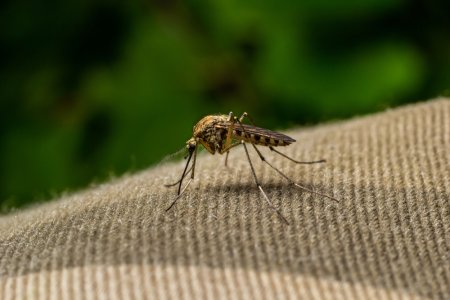Deadly Mosquito Virus Strikes Again: How to Protect Yourself as Second Death Confirmed in United States
As the warmer months come to an end the hum of mosquitoes should slowly be dying down. However, sadly a more sinister buzz surrounds the recent confirmation of a second death in New York due to the eastern equine encephalitis virus, otherwise known as EEE. This rare but serious condition has prompted state officials to issue warnings and take action to protect residents from the growing threat of mosquito-borne diseases.
The unfortunate passing of an unnamed individual marks New York's first fatality from EEE since 2015, as announced by Governor Kathy Hochul. “We’ve been informed this patient has passed away from EEE, we extend our sympathies and our hearts go out to their family,” Hochul expressed in a statement.
The case, which is currently under investigation by the Ulster County Department of Health, is the second reported EEE-related death in the United States this year, following a previous fatality in New Hampshire last month.
In response to the news, New York's local health departments have ramped up mosquito control efforts, including spraying programs that will continue through November. Additionally, state parks are offering mosquito repellent to visitors, a move that is part of a broader initiative led by Governor Hochul.
Dr. James McDonald, New York state health commissioner, has issued a Declaration of an Imminent Threat to Public Health due to EEE. “Following the first confirmed human case of EEE, my administration took statewide action to help protect communities – and with today’s declaration we’re making more State resources available to local departments to support their public health response,” Hochul stated.
What is EEE?
EEE is a rare but severe illness transmitted to humans through the bite of an infected mosquito. According to the Centers for Disease Control and Prevention (CDC), the United States averages only about 11 human cases of EEE each year. However, this year has seen a spike in reported cases, matching the annual average in September and therefore raising concerns.
While only a small percentage of EEE infections in humans result in illness, those who do become ill can experience symptoms ranging from fever, chills, body aches, and joint pain to more severe conditions such as meningitis or encephalitis when the central nervous system is affected. Approximately one-third of individuals with severe EEE do not survive, and many who do face long-term neurological issues. The most vulnerable populations include individuals under 15 and over 50 years of age.
Currently, there are no vaccines or specific treatments available for EEE, making prevention through mosquito bite avoidance crucial. The CDC recommends using insect repellents, wearing long-sleeved clothing, and taking precautionary steps to eliminate mosquitos both in and outdoors.
Where are we seeing cases of EEE?
Historically, EEE cases have been concentrated in the eastern or Gulf Coast states and the Great Lakes region. This year, the Northeast has seen a rise in EEE detections in people, horses, and mosquitoes.
As the season changes, it's important to remember that mosquitoes remain active until temperatures consistently drop. New Yorkers and others in affected regions should heed the advice of health officials and take proactive steps to protect themselves and their loved ones from the threat of mosquito-borne illnesses.

To all of our members, especially those of you who enjoy the outdoors or those who reside in areas known for mosquito activity, we urge you to take good care of yourselves and your loved ones! If you can get insect repellent be sure to do so, and if you cannot, wear long sleeved shirts and long pants if you can. If you have any of your own tips and tricks as to how you combat mosquitoes at home, please share them with us in the comments below!
The unfortunate passing of an unnamed individual marks New York's first fatality from EEE since 2015, as announced by Governor Kathy Hochul. “We’ve been informed this patient has passed away from EEE, we extend our sympathies and our hearts go out to their family,” Hochul expressed in a statement.
The case, which is currently under investigation by the Ulster County Department of Health, is the second reported EEE-related death in the United States this year, following a previous fatality in New Hampshire last month.
In response to the news, New York's local health departments have ramped up mosquito control efforts, including spraying programs that will continue through November. Additionally, state parks are offering mosquito repellent to visitors, a move that is part of a broader initiative led by Governor Hochul.
Dr. James McDonald, New York state health commissioner, has issued a Declaration of an Imminent Threat to Public Health due to EEE. “Following the first confirmed human case of EEE, my administration took statewide action to help protect communities – and with today’s declaration we’re making more State resources available to local departments to support their public health response,” Hochul stated.
What is EEE?
EEE is a rare but severe illness transmitted to humans through the bite of an infected mosquito. According to the Centers for Disease Control and Prevention (CDC), the United States averages only about 11 human cases of EEE each year. However, this year has seen a spike in reported cases, matching the annual average in September and therefore raising concerns.
While only a small percentage of EEE infections in humans result in illness, those who do become ill can experience symptoms ranging from fever, chills, body aches, and joint pain to more severe conditions such as meningitis or encephalitis when the central nervous system is affected. Approximately one-third of individuals with severe EEE do not survive, and many who do face long-term neurological issues. The most vulnerable populations include individuals under 15 and over 50 years of age.
Currently, there are no vaccines or specific treatments available for EEE, making prevention through mosquito bite avoidance crucial. The CDC recommends using insect repellents, wearing long-sleeved clothing, and taking precautionary steps to eliminate mosquitos both in and outdoors.
Where are we seeing cases of EEE?
Historically, EEE cases have been concentrated in the eastern or Gulf Coast states and the Great Lakes region. This year, the Northeast has seen a rise in EEE detections in people, horses, and mosquitoes.
As the season changes, it's important to remember that mosquitoes remain active until temperatures consistently drop. New Yorkers and others in affected regions should heed the advice of health officials and take proactive steps to protect themselves and their loved ones from the threat of mosquito-borne illnesses.
Key Takeaways
- New York reported its first death from the eastern equine encephalitis virus (EEE) since 2015, leading to a warning from the governor about the dangers of mosquito-borne diseases.
- The state has undertaken measures such as spraying for mosquitoes through November and making repellent available in state parks to combat the spread of EEE.
- EEE is a rare but serious condition that can cause symptoms ranging from fever and body aches to severe neurologic issues, and there is currently no vaccine or specific treatment for the disease.
- The best way to prevent EEE is to avoid mosquito bites by using repellents and wearing protective clothing like long-sleeved shirts and long pants.
To all of our members, especially those of you who enjoy the outdoors or those who reside in areas known for mosquito activity, we urge you to take good care of yourselves and your loved ones! If you can get insect repellent be sure to do so, and if you cannot, wear long sleeved shirts and long pants if you can. If you have any of your own tips and tricks as to how you combat mosquitoes at home, please share them with us in the comments below!







